|
|
|
Sort Order |
|
|
|
Items / Page
|
|
|
|
|
|
|
| Srl | Item |
| 1 |
ID:
143287
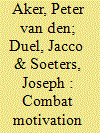

|
|
|
|
|
| Summary/Abstract |
This research note presents the findings of a survey study among veterans from the Netherlands armed forces who participated in operations since the Second World War. The aim of the study is to reveal the veterans’ experiences with respect to their combat motivation—or lack thereof—and actual participation in combat actions. The data demonstrate that over time the degree of combat motivation has increased. The data also demonstrate that those who participated in combat actions and were motivated to do so are generally positive about operational and social–psychological aspects of the organization and its surroundings. The implications of these findings are discussed.
|
|
|
|
|
|
|
|
|
|
|
|
|
|
|
|
| 2 |
ID:
154389
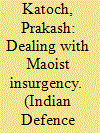

|
|
|
|
|
| Summary/Abstract |
Hundreds of CAPF battalions have been raised and there is no reason they cannot deal with internal security issues. They must perform/be made to perform, and most importantly, dominate the Dandakaranya forest, where on occasional foray and chest-thumping are useless, Surely, we need to look at a more integrated and deeper approach including MHA taking direct responsibility and control of counter-maoists operations rather than merely dishing out CAPF units to states; reorganising CRPF units in CI role on the lines of Rashtriya Rifles/Assam Rifles; discontinue the practice of imposing IPS officers on CRPF organisations; give the CRPF their own officers, review their training and imbibe the culture of officers leading troops in operations and ensure unity of command. The MHA must get into the acto rather than bureaucrats looking over the shoulder towards the Army, and help our enemies in getting the army sucked in here too.
|
|
|
|
|
|
|
|
|
|
|
|
|
|
|
|
| 3 |
ID:
103181
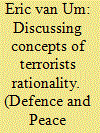

|
|
|
|
|
| Publication |
2011.
|
| Summary/Abstract |
Many researchers on terrorism tend to characterize terrorists as instrumentally rational and politically motivated. Empirically, however, terrorists often seem to deviate from instrumentally rational behavior and to be motivated by other than political reasons. This paper details the explanatory power of various concepts of terrorist rationality incorporating motivations beyond political ones. Results show that none of the concepts discussed accounts for all terrorist actions but all of the concepts are capable of explaining certain aspects of the phenomenon of terrorism. A discussion follows on the appropriateness of specific counterterrorism measures for the concepts of rationality and motivations identified.
|
|
|
|
|
|
|
|
|
|
|
|
|
|
|
|
| 4 |
ID:
156906


|
|
|
|
|
| Summary/Abstract |
This research used open source information to investigate the motivational backgrounds of 219 suicide attackers from various regions of the world. We inquired as to whether the attackers exhibited evidence for significance quest as a motive for their actions, and whether the eradication of significance loss and/or the aspiration for significance gain systematically differed according to attackers’ demographics. It was found that the specific nature of the significance quest motive varied in accordance with attackers’ gender, age, and education. Whereas Arab-Palestinians, males, younger attackers, and more educated attackers seem to have been motivated primarily by the possibility of significance gain, women, older attackers, those with little education, and those hailing from other regions seem to have been motivated primarily by the eradication of significance loss. Analyses also suggested that the stronger an attacker’s significance quest motive, the greater the effectiveness of their attack, as measured by the number of casualties. Methodological limitations of the present study were discussed, and the possible directions for further research were indicated.
|
|
|
|
|
|
|
|
|
|
|
|
|
|
|
|
| 5 |
ID:
041214
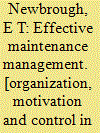

|
|
|
|
|
| Publication |
New York, McGraw-Hill Book Company, 1967.
|
| Description |
xvi, 368p.Hbk
|
|
|
|
|
|
|
|
|
|
|
|
Copies: C:1/I:0,R:0,Q:0
Circulation
| Accession# | Call# | Current Location | Status | Policy | Location |
| 003999 | 658.5/NEW 003999 | Main | On Shelf | General | |
|
|
|
|
| 6 |
ID:
119414
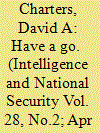

|
|
|
|
|
| Publication |
2013.
|
| Summary/Abstract |
Early in the Northern Ireland conflict the army took the lead in intelligence operations, including Humint. This article examines the case of 'Observer B', an agent run jointly with MI5. Using testimony and documents provided to the Bloody Sunday Inquiry as well as original archival sources, it offers a unique Humint case study that discusses the agent's recruitment, motivation, reliability, handling, product, and utility. This represents the most complete account that we have of this case, but gaps remain. It illustrates some of the limitations of clandestine Humint collection in situations where information may be time-sensitive. The article challenges the conventional wisdom about army/MI5 relations and shows how the two improvised and cooperated in agent-running.
|
|
|
|
|
|
|
|
|
|
|
|
|
|
|
|
| 7 |
ID:
124637


|
|
|
|
|
| Publication |
2013.
|
| Summary/Abstract |
It is commonly accepted that leaders play a crucial role in collective action. Existing literature has suggested a number of factors that contribute to the emergence of leaders including, among others, personality, sense of moral responsibility, community pressure, self-interest and institutional exclusion. However, current research tends to suggest that activists are driven by a particular reason to become leaders and that their motivation is static. Based on intensive fieldwork in residential communities in Beijing, this article illustrates that leaders' motivations can be mixed or multiple and that leaders may re-prioritize or adjust their objectives over the course of collective action. The re-prioritizing tends to alter the leaders' behaviour and affect group solidarity and interactions with other group members.
|
|
|
|
|
|
|
|
|
|
|
|
|
|
|
|
| 8 |
ID:
132304


|
|
|
|
|
| Publication |
2014.
|
| Summary/Abstract |
This article presents an analysis of Al Qaeda in the Arabian Peninsula's English language publication Inspire that was conceptualized and conducted on the basis of the Information-Motivation-Behavioral Skills (IMB) framework. The IMB model has been widely tested, validated, and applied across a range of behavior change interventions, and provides both a conceptual and analytic framework to examine the range and quality of content featured across the 11 issues of Inspire that were published and distributed online starting in July of 2010. Inspire has been implicated in multiple instances of terrorism cases in the U.S. and its impact and potential can be analyzed on the extent to which it effectively targets core attitudes, perceptions of social normative support for violence, and its regular featuring of behavioral skills such as bomb making, weapons training, and emphasizing a creative and do-it-yourself ethos.
|
|
|
|
|
|
|
|
|
|
|
|
|
|
|
|
| 9 |
ID:
087300
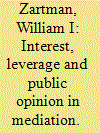

|
|
|
|
|
| Publication |
2009.
|
| Summary/Abstract |
Saadia Touval's important contributions to the study of mediation included an emphasis on the interests and motivations of mediators, hitherto often assumed to be pure or non-existent. As a result, legitimacy is usually considered to be inherent in the selfless mediator, although in internal affairs, mediation is illegitimate meddling. At the same time, much of the work on mediation either exaggerates or underestimates the nature of leverage. Public opinion also has an important but ambiguous relation to mediation. Interests, public opinion and leverage were topics where Touval helped to establish a more realistic appreciation, as illustrated in this second commemorative issue of International Negotiation.
|
|
|
|
|
|
|
|
|
|
|
|
|
|
|
|
| 10 |
ID:
171874
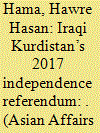

|
|
|
|
|
| Summary/Abstract |
On 7 June 2017, the former Kurdistan president Massoud Barzani called a meeting between 15 Kurdish political parties to seek their approval for a referendum on Iraqi Kurdish independence. Despite many adverse circumstances – the proroguing of the Kurdistan parliament, the strained relations among the Kurdish political parties, and the general political stalemate in Iraqi Kurdistan – the meeting agreed that a referendum should take place on 25 September 2017. However, both the Gorran Movement (Gorran) and the Kurdistan Islamic Group (Komal) refused to take part in the meeting and instead requested that the government's main focus be on restoring the political environment and restarting the Kurdistan parliament before any discussions take place on the issue of a Kurdish referendum. Notwithstanding internal, regional and international pressures, the Kurdistan Regional Government pressed ahead and held its referendum on 25 September 2017. The central question that remains about the Kurdistan referendum is what really motivated Kurdish politicians, in particular those of the Kurdistan Democratic Party (KDP) to hold the poll? This article argues that the KDP has a number of different public and private motivations in holding the independence referendum, which need to be explored.
|
|
|
|
|
|
|
|
|
|
|
|
|
|
|
|
| 11 |
ID:
089697
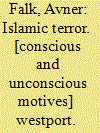

|
|
|
|
|
| Publication |
Westport, Praeger Security International, 2009.
|
| Description |
x, 267p.
|
| Standard Number |
9780313357644
|
|
|
|
|
|
|
|
|
|
|
|
Copies: C:1/I:0,R:0,Q:0
Circulation
| Accession# | Call# | Current Location | Status | Policy | Location |
| 054253 | 363.325/FAL 054253 | Main | On Shelf | General | |
|
|
|
|
| 12 |
ID:
159118


|
|
|
|
|
| Summary/Abstract |
Governments rely on both hard and soft power to neutralize terrorists. The State
and Defense Departments offer rewards running to millions of dollars for information
to aid in the fight, but these programs receive a surprising lack of scrutiny.
Both historical and psychological analysis can improve our framing and execution
of such programs.
|
|
|
|
|
|
|
|
|
|
|
|
|
|
|
|
| 13 |
ID:
167147
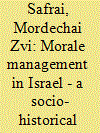

|
|
|
|
|
| Summary/Abstract |
This article describes the origins of socio-management research in Israel, as reflected in the work of Louis Guttman. In a booklet produced during the War of Independence, he developed a model for leadership training in the young army, the transition from an underground militia to a regular army, diversity management in an age of mass immigration, and motivation of individuals in a collectivist society. The circumstances leading to the integration in Israel's Defence Forces (IDF) of a worldwide expert like Guttman, offer a unique opportunity to study a case where socio-management knowledge is embedded in military organisational practices from the outset.
|
|
|
|
|
|
|
|
|
|
|
|
|
|
|
|
| 14 |
ID:
132977
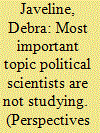

|
|
|
|
|
| Publication |
2014.
|
| Summary/Abstract |
Surprise is an intrinsic fact of political life and its elimination, especially with regard to extraordinary moments of protest and revolution, is a vain endeavor. Prediction and explanation are fundamentally different enterprises. While scholars may be well-positioned to trace, retrospectively, the motivation, networks, leadership, and other contextual factors that fueled the events of 2011 and 1989, such analysis will never bestow the sort of predictive power that will eliminate the surprise of mass uprisings. Verstehen-esque studies of mobilization, while crucially enlightening, have limited capacity to augment our powers of foresight due to the fundamental gulf between agency and intention as well as the causal disconnect between precedent and prediction.
|
|
|
|
|
|
|
|
|
|
|
|
|
|
|
|
| 15 |
ID:
069900
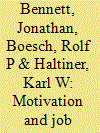

|
|
|
|
|
| Publication |
2005.
|
| Summary/Abstract |
Motivation and its determinants were the focus of this three-point survey among the 5th Swiss Support Company in Suva Reka, Kosovo. Belief in the meaningfulness of the tasks and in the benefits of their activities proved to be the main predictive factors both for volunteering and for reporting higher levels of personal satisfaction. Great importance can also be attributed to the moral support provided by the personal environment at home (parents, friends, acquaintances). Other motivating aspects (quality of training and equipment, infrastructure) only gradually unfold their influence on motivation and job satisfaction. In general, motivation was found to be high at the beginning of the mission, but clearly lower halfway through. Towards the end of the mission, motivation increased again but did not reach the initial level. Special attention should be paid to horizontal and vertical cohesion in the contingent, the quality of catering and the conditions of collaboration with other national contingents.
|
|
|
|
|
|
|
|
|
|
|
|
|
|
|
|
| 16 |
ID:
043467
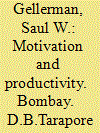

|
|
|
|
|
| Publication |
Bombay, D.B.Taraporevala Sons & Co. Private Ltd., 1963.
|
| Description |
304p.Hbk
|
|
|
|
|
|
|
|
|
|
|
|
Copies: C:1/I:0,R:0,Q:0
Circulation
| Accession# | Call# | Current Location | Status | Policy | Location |
| 006154 | 658.401/GEL 006154 | Main | On Shelf | General | |
|
|
|
|
| 17 |
ID:
145739
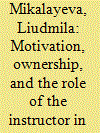

|
|
|
|
|
| Summary/Abstract |
This article systematizes recently published accounts and the author’s experience on motivation, learning process ownership, and the role of the instructor in active learning methods, such as role-plays. It argues that active learning is most productive when the instructor creates and consistently enforces a stable and clear framework of rules. Active learning methods often produce higher levels of motivation, thanks to a greater visibility of students’ efforts, higher stakes of success within a competitive collaborative setup, and a greater ownership of the whole process by students. High levels of motivation arguably improve the quality and depth of learning. Novice users of active learning may, therefore, perceive that the self-effacement of the instructor in a fully horizontal cooperative setting is the right way to optimize learning outcomes. However, ownership and increased motivation are likely to create several problems—overmotivation, confusion, alienation, and hostility—that can be solved best by the instructor. This article uses a conceptualization of the student–instructor relationship in which cooperation and dominance are not mutually exclusive and claims that instead of self-effacement, a cooperative, but authoritative, relationship between students and instructor maximizes the learning potential in active learning settings..
|
|
|
|
|
|
|
|
|
|
|
|
|
|
|
|
| 18 |
ID:
168474
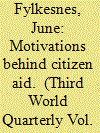

|
|
|
|
|
| Summary/Abstract |
Little is known about citizen aid initiatives originating in Norway, and they are not recognised as part of the official Norwegian development aid. Citizen aid initiatives are personal and small, and by themselves they do not raise large sums of money, nor do they individually have a large-scale development impact. But collectively, their influence on sponsors in Norway and on aid beneficiaries in the Global South might be substantial. Through qualitative interviews, this study explores the motivations of Norwegian founders of citizen aid initiatives, who run small development projects in The Gambia. The study finds that they are motivated by the very characteristics of these citizen aid initiatives which set them apart from formal development organisations. These include the initiatives’ small size, which allows for a personal closeness to and control over the projects. These features are often interconnected with motivations stemming from the founders’ personal experiences. The study finds that, inasmuch as the founders see the need for beneficiaries to be supported, they also experience a need to help themselves. The founders’ identities, as helpers and givers, are both formed and continually reinforced by their personal involvement in this specific type of aid work.
|
|
|
|
|
|
|
|
|
|
|
|
|
|
|
|
| 19 |
ID:
166150
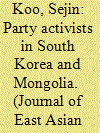

|
|
|
|
|
| Summary/Abstract |
Party activists are important for building party–voter links. This study focuses on the motivations of these activists and the hypothesis that economic factors are associated with more programmatic and policy-driven platforms. I examine a novel comparative survey data set of party activists collected in multiple districts in South Korea and Mongolia to determine whether national economic development, the local economy, or individual income shapes activist motivations. The results challenge the economic account and, instead, shed light on the importance of party characteristics, such as size, ideology, and whether a party has its roots in authoritarianism.
|
|
|
|
|
|
|
|
|
|
|
|
|
|
|
|
| 20 |
ID:
152867
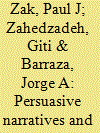

|
|
|
|
|
| Summary/Abstract |
Persuasive narratives can induce some individuals to engage in costly actions. Entrepreneurs of suicide missions frame the necessity of violent behavior within the context of persuasive narratives to attract potential recruits. Herein we report results from an experiment to test factors involved with costly action linked to a persuasive narrative. We recruited 164 participants (M = 21, SD = 5.20) and measured hormones, electrodermal activity, and personality to predict who would be influenced by the narrative's message. We found that the persuasive narrative we tested resulted in costly action by those who are high-perspective takers and are more physiologically aroused by the narrative. The findings fill lacunae in the literature, providing a novel approach to examine costly behavior (like martyrdom missions) in the laboratory.
|
|
|
|
|
|
|
|
|
|
|
|
|
|
|
|
|
|
|
|
|